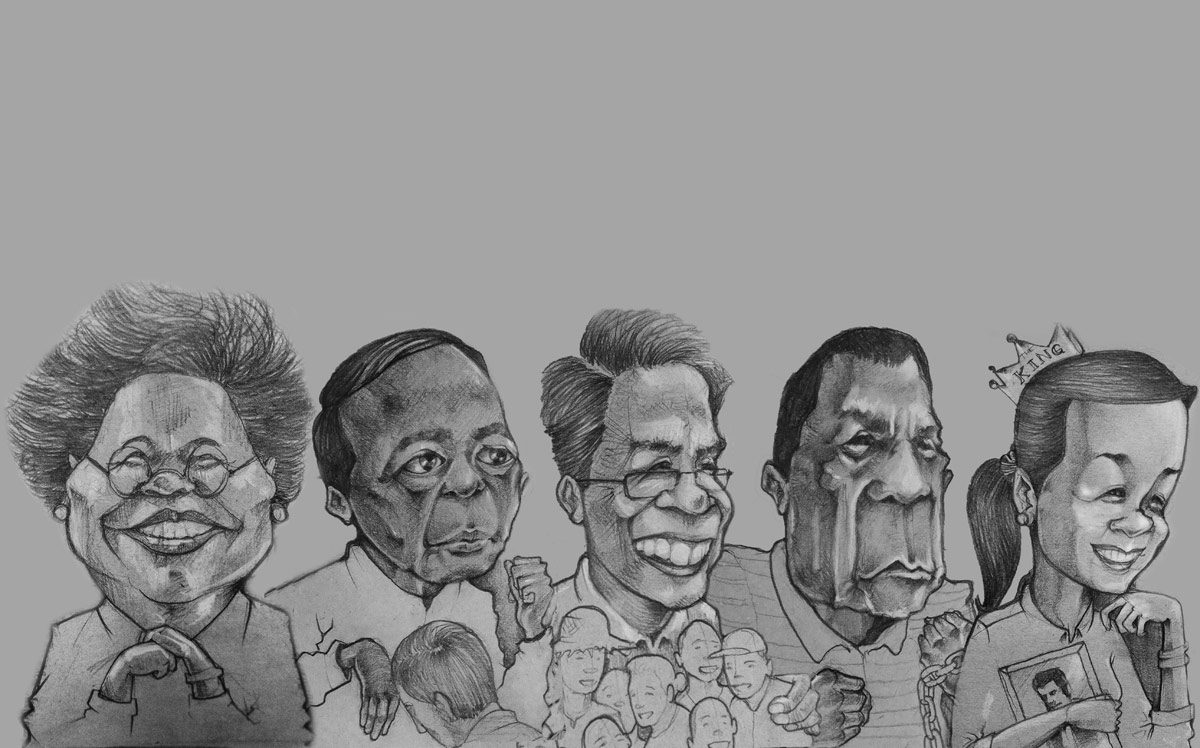SUMMARY
This is AI generated summarization, which may have errors. For context, always refer to the full article.

This compilation was migrated from our archives
Visit the archived version to read the full article.
Illustrations by Geloy Concepcion Design by ANALETTE ABESAMIS and DOMINIC TUAZON
Rappler’s series of presidential profiles begins with the idealized candidate. Here, in the first of a three-part series, we present the narrative we believe best embodies a candidate’s ideal self. Our portrayal of the imagined candidate is based on how the candidates – and their supporters – project themselves. No candidate is perfect, but by parsing out the idealized narrative, we hope to prompt reflection on which virtues of leadership, at least in principle, appeals to us the most.
It is a perfect day. The lawns are manicured. The trees march in rows. Buildings spear into the sky. This is the city where the suburban dream comes true: joggers in neon sneakers, dogs trotting on leashes, conference rooms filled with wrapped presents. Every motorcyclist wears a helmet. Every bus has room. Every face smiles over the neckline of a yellow shirt. This is where young love blooms, where robed graduates throw high their tasseled hats, and the sky fills with yellow balloons.
Welcome to Pleasantville, the future as imagined by Manuel Araneta Roxas II. Watch him, surrounded by smiles and pretty faces. Look at him laugh, watch him dance, see him throw a ball, score a shot, wave at crowds, grin at his wife, high five, fist bump, fast, forward, to the future.
Vote for him, and his city is yours.
Fast forward
This is Mar Roxas, scion of the Roxas clan, son to a senator, grandson to a president, the man who left behind his career to take his dead brother’s place. Here walks the standard-bearer and anointed king, who stepped aside to watch another prince sweep into the palace trailing hope and confetti. Here is the man so certain of his vice presidency that he lost his footing, accepting instead the unelected mandate of a cabinet department.
He worked and waited. He was alternately dismissed and supported. He followed orders, he took the fall, he nursed his wounds, all the while watching his numbers drop and his party waver in their commitment. There were meetings. There were negotiations. There were other candidates, with higher survey ratings.
When finally the President spoke and said his name, the public was told there had never been any doubts. It is a choice, Aquino said, between those “who will continue along the straight path and fully break the system of patronage,” or someone “who is always looking for someone to bring us back to the cycle of poverty and corruption.”
To vote Roxas is to vote for progress. To vote against Roxas is to vote for corruption. It is a binary choice, a narrative firmly anchored on the Aquino legacy. Aquino achieved the dream. Roxas will bring it forward.
“We are a serious people,” said Roxas in his acceptance speech, “who are serious with our dreams, who have just had a taste of what serious, selfless leadership can achieve.”
‘The key to victory’
Roxas, says his people, is the man who can get the job done. He is the expert, the detail man, the investment banker who can troubleshoot any problem and bring the nation into a competitive future. Roxas himself can dazzle with numbers and statistics. He has an impressive academic and professional record. He answers questions with processes and particulars, instead of the categorical.
His team has highlighted improvements he led in aviation and transportation, the economy and information technology, as well as tax reform and cheaper medicines – painting a picture of a man focused on building practical, day-to-day solutions that quietly improve lives.
“Sometimes my passion is misinterpreted to being a snob, but I mean no ill-will, I’m just passionate and impatient for solutions and that’s what drives me to push for exactly what’s happening.”
(READ: #TheLeaderIWant: Mar Roxas on Daang Matuwid and decisiveness)
Roxas may anchor his story on the promise of continuing Aquino’s straight path, but there is a glaring difference between the two men. Aquino is popular. Roxas is not. Three months before the elections, Roxas has yet to become the front runner in any credible presidential poll.
(READ: Mar Roxas: His own enemy)
Roxas himself is not unaware of his unpopularity. A breakfast conversation with US Ambassador Kristie Kenney, detailed in a confidential cable released by Wikileaks, describes Roxas as frank in his assessment of his presidential chances.
The cable, sent as early as 2008, noted Roxas’ conviction that “the key to victory…would be convincing the lower classes that the person running had their interests at heart.” He told Kenney that “he was not sure how he personally would tackle that problem, given that his Wharton MBA and ten years on Wall Street as an investment banker did not ‘exactly call to the common man.’”
It is perhaps this criticism, one that has dogged him during the Aquino administration, that fuels Roxas’ persistent attempt to build a more relatable public image. In the last five years, Roxas began appearing in photographs among the populace, riding trains, driving pedicabs, carrying sacks of onions, hammering nails into broken school tables.
Out with the cool kids
One of his more controversial advertisements, released in late December, is set at the Bonifacio Global City, the exclusive enclave for the aspirational middle class. The video is graded to hyper-real color – ultramarine skies, brilliant green lawns, a skyline purpling blue in the distance.
Here, Mar Roxas, is both the class valedictorian and the prom king. He is the jock, body bumping the basketball star. He is the beloved leader, mobbed by an adoring crowd. The ordinary people remain set pieces, waving behind the singing, swinging stars of television.
The ad positions Roxas inside his imagined future, a future where Manuel Roxas is the most popular kid in school.
The disconnect between Roxas the man and Roxas the dream exploded on social media – so badly that every endorser was accused of having been paid to appear.
Ramon Bautista, the populist comedian who appeared in the video, defended Roxas, arguing there are issues more important than “an awkward fist bump.” Bautista had once been part of a segment on his own television show mocking Roxas for attempting to entertain a clearly uninterested young boy with a magical fist bump.
“Is it that he isn’t cool and was awkward in his attempt to fist bump?” Bautista asked on Instagram. “Is it that his own PR team always screws up? Try reading his platform when you have time. Marroxas.com sir.”
It is this defense, more than any other criticism of Roxas, that highlights the quandary at the center of the Roxas campaign narrative. Mar for the people is not of the people.
No drama
It is in this context that the Roxas campaign put forward a clearer, simpler narrative. A new ad, released in the final weeks before the official start of the campaign period, shows Roxas alone, facing the camera, with balloons and celebrities conspicuously absent.
“This is Mar Roxas,” he says. “They say I never knew poverty. They say I have no dramatic story. But this election isn’t about me. This is about you and your families. I won’t be making an emotional appeal. I will be focusing on jobs for you. That’s what I know. That’s what I can do.”
It is the first public acknowledgment of what many see as Roxas’ inability to engage, and a concession that all may not have benefited from the Aquino administration.
“I will continue down the straight path,” says Roxas. “If anything is lacking, I will fill the gap. If mistakes have been made, I will correct them.”
It is a narrative consistent with Roxas’ public personality and personal biography, the private man forced into a public life and doing the necessary work of governance. Charm or popularity is not a factor here, only results.
The ad separates Roxas from the operatic storyline driving the Grace Poe campaign, whose foundling hero comes to avenge the stolen presidency of her adoptive father. “I don’t have drama, and I’m not asking for pity,” he says in in a 20-second version of the ad.
He compares himself to the tough-talking Davao mayor Rodrigo Duterte.
“I’m not a bully and an abuser.”
It is the last line of the ad that Roxas saves for Jejomar Binay. Binay, whose rags-to-riches story made him a hero among a
“Most of all,” Roxas promises, “I will not steal from you.”
This Mar Roxas is the hardworking bureaucrat, without airs and without ego. Here is the brilliant technocrat in shirtsleeves, focused on his people’s future. Here is the public servant humbly conceding there may be much left to be done.
In an interview after the ad’s release, asked why he was running for the presidency, he answered that while he may “have everything,” his countrymen do not.
“It cannot be allowed that so few are comfortable, while the majority are impoverished.”
This is Mar Roxas, version 2016, stolid and square, armed with briefcase and calculator, marching fast, forward, to the future. – Rappler.com
(Editor’s note: All quotes have been translated from their original form to English).
Patricia Evangelista is Rappler’s multimedia manager. She is an international fellow of the Dart Center Ochberg Fellowship for Trauma Reporting and was awarded the Kate Webb Prize for exceptional journalism in dangerous conditions. In 2016, she received The Outstanding Young Men award for the field of journalism. Tweet her @patevangelista.
 Nicole Curato is a sociologist from the University of the Philippines. She is currently a Discovery Early Career Research Award Fellow at the Center for Deliberative Democracy & Global Governance based in Canberra. In 2013, she received The Outstanding Young Men award for the field of sociology. Tweet her @NicoleCurato.
Nicole Curato is a sociologist from the University of the Philippines. She is currently a Discovery Early Career Research Award Fellow at the Center for Deliberative Democracy & Global Governance based in Canberra. In 2013, she received The Outstanding Young Men award for the field of sociology. Tweet her @NicoleCurato.

THE IMAGINED PRESIDENT
Rappler”s presidential profile series maps the narratives presented by both candidates and critics in the campaign for 2016
Add a comment
How does this make you feel?
There are no comments yet. Add your comment to start the conversation.